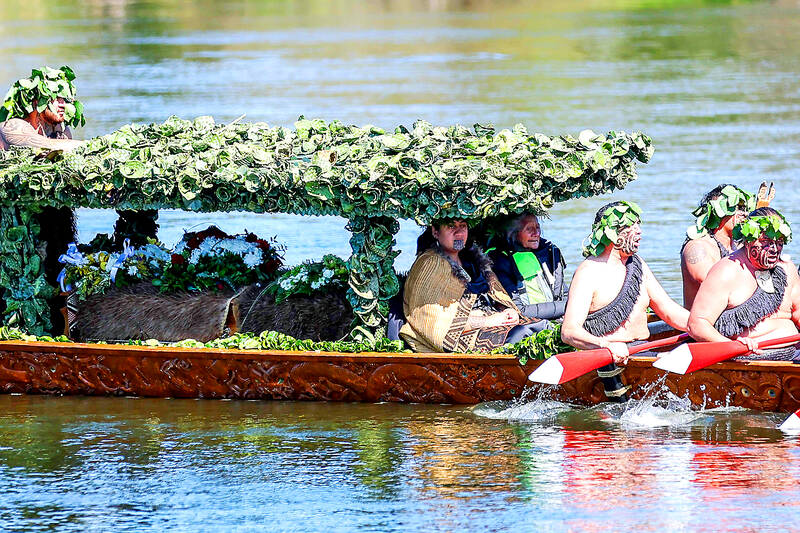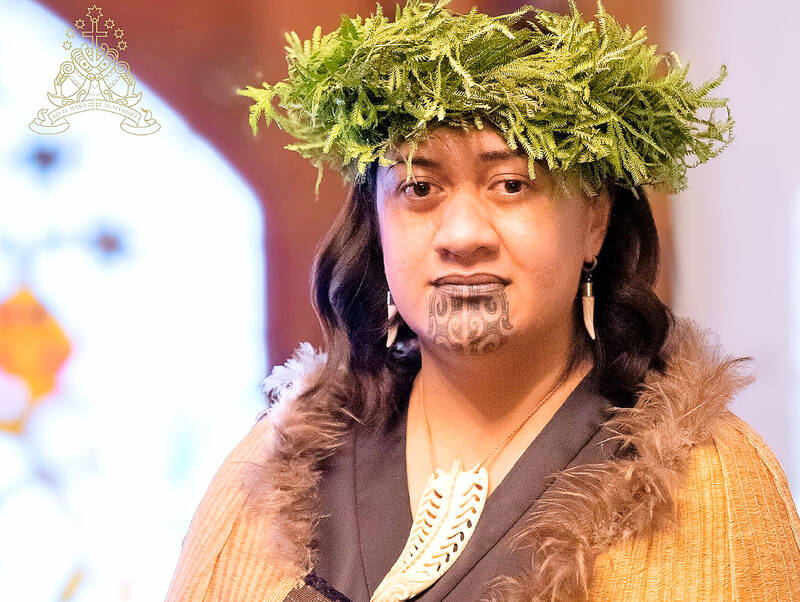New Zealand’s Maori chiefs yesterday anointed a 27-year-old queen as their new monarch, a surprise choice hailed as a symbol of change for the country’s indigenous community.
Nga Wai hono i te po Paki was cheered by thousands as she ascended a high-backed wooden throne during an elaborate ceremony in Ngaruawahia.
She is the youngest daughter of King Tuheitia Pootatau Te Wherowhero VII, who died on Friday last week after heart surgery.

Photo: AFP
After being elected by a council of chiefs, Nga Wai was ushered to the throne by a phalanx of bare-chested and tattooed men bearing ceremonial weapons who chanted, screamed and shouted in acclamation.
The queen, wearing a wreath of leaves, a cloak and a whalebone necklace, sat beside her father’s coffin as emotive rites, prayers and chants were performed. After six days laid in state, the late king was carried down the Waikato River as part of a flotilla of four war canoes, each powered by more than a dozen rowers.
His funerary procession passed throngs of onlookers camped on the riverbanks, before stopping at the foot of Mount Taupiri.

Photo: AFP / Kiingitanga
From there, three rugby union teams acted as pallbearers, shepherding his coffin up steep slopes to the summit and the final resting place of Maori royals.
The Maori monarch is a mostly ceremonial role with no legal status, but it has enormous cultural and sometimes political significance as a potent symbol of identity and kinship.
As the king’s only daughter and his youngest child, Queen Nga Wai was considered an outside choice to become his successor.
One of her two elder brothers had taken on many ceremonial duties during their father’s periods of ill health and had been widely tipped to take over.
Queen Nga Wai is the eighth Maori monarch and the second queen. Her grandmother, Queen Te Arikinui Dame Te Atairangikaahu, held the position for four decades until 2006.
“It is certainly a break from traditional Maori leadership appointments which tend to succeed to the eldest child, usually a male,” Maori cultural adviser Karaitiana Taiuru told reporters.
Taiuru said it was a “privilege” to witness a young Maori woman become queen, particularly given the ageing leadership and mounting challenges faced by the community.
“The Maori world has been yearning for younger leadership to guide us in the new world of AI [artificial intelligence], genetic modification, global warming and in a time of many other social changes that question and threaten us and indigenous peoples of New Zealand,” he said. “These challenges require a new and younger generation to lead us.”
The kiingitanga, or Maori king movement, was founded in 1858 to unite New Zealand’s tribes and provide a single counterpart to the colonial ruler, Britain’s Queen Victoria.
“People think Maori people are one nation — we’re not. We’re many tribes, many iwi. We have different ways of speaking out,” said Joanne Teina, who traveled from Auckland for the ceremony. “The kiingitanga was created to create unity — among people who were fighting each other for thousands of years, before pakeha [Europeans] came along.”

Drug lord Jose Adolfo Macias Villamar, alias “Fito,” was Ecuador’s most-wanted fugitive before his arrest on Wednesday, more than a year after he escaped prison from where he commanded the country’s leading criminal gang. The former taxi driver turned crime boss became the prime target of law enforcement early last year after escaping from a prison in the southwestern port of Guayaquil. Ecuadoran President Daniel Noboa’s government released “wanted” posters with images of his face and offered US$1 million for information leading to his capture. In a country plagued by crime, members of Fito’s gang, Los Choneros, have responded with violence, using car

CYBERCRIME, TRAFFICKING: A ‘pattern of state failures’ allowed the billion-dollar industry to flourish, including failures to investigate human rights abuses, it said Human rights group Amnesty International yesterday accused Cambodia’s government of “deliberately ignoring” abuses by cybercrime gangs that have trafficked people from across the world, including children, into slavery at brutal scam compounds. The London-based group said in a report that it had identified 53 scam centers and dozens more suspected sites across the country, including in the Southeast Asian nation’s capital, Phnom Penh. The prison-like compounds were ringed by high fences with razor wire, guarded by armed men and staffed by trafficking victims forced to defraud people across the globe, with those inside subjected to punishments including shocks from electric batons, confinement

The team behind the long-awaited Vera Rubin Observatory in Chile yesterday published their first images, revealing breathtaking views of star-forming regions as well as distant galaxies. More than two decades in the making, the giant US-funded telescope sits perched at the summit of Cerro Pachon in central Chile, where dark skies and dry air provide ideal conditions for observing the cosmos. One of the debut images is a composite of 678 exposures taken over just seven hours, capturing the Trifid Nebula and the Lagoon Nebula — both several thousand light-years from Earth — glowing in vivid pinks against orange-red backdrops. The new image

Canada and the EU on Monday signed a defense and security pact as the transatlantic partners seek to better confront Russia, with worries over Washington’s reliability under US President Donald Trump. The deal was announced after a summit in Brussels between Canadian Prime Minister Mark Carney and European Commission President Ursula von der Leyen and European Council President Antonio Costa. “While NATO remains the cornerstone of our collective defense, this partnership will allow us to strengthen our preparedness ... to invest more and to invest smarter,” Costa told a news conference. “It opens new opportunities for companies on both sides of the